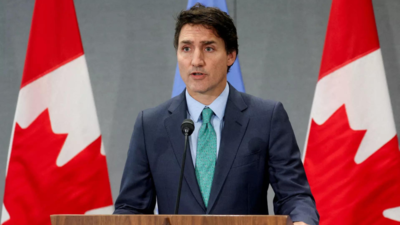Will he quit or not? The suspense over Justin Trudeau’s resignation has kept Canada on edge amid growing pressure from his own party.
Trudeau has maintained a notably low profile since December 16, when his key cabinet member and finance minister Chrystia Freeland stepped down. Her departure was particularly impactful, as she released a critical public letter expressing her dissatisfaction with his leadership. The resignation of this once-influential ally dealt a significant blow to his administration.
The PM spent much of the holidays at a ski resort in western Canada and is not planning any official events or appearances by the end of the week, a person familiar with his schedule told Bloomberg. He has given no public indication yet of when he’ll announce a decision about his future.
Growing pressure to resign
Meanwhile, Liberal Party members are intensifying pressure on him to resign as polling numbers continue to decline. A recent Nanos Research survey conducted during the holidays indicates the Conservative Party’s growing advantage as elections approach.
According to the Canadian Broadcasting Corporation, Liberal caucus members from Quebec, the prime minister’s home province, have requested his departure, following similar appeals from Ontario. Several Liberal MPs have openly expressed their stance, including Toronto’s Rob Oliphant, who published a letter requesting a “new leader elected through a robust, open leadership contest.”
Representatives from Atlantic provinces emphasised the urgency of leadership change, citing concerns about Donald Trump’s potential return to power. Kody Blois, representing Liberal members from eastern provinces, warned about possible economic instability, particularly regarding potential US tariffs on Canadian imports.
“The country could face instability, notably from an economic threat in the potential of a 25 per cent US tariff on Canadian imports from the incoming administration,” Blois said. “Simply put, time is of the essence,” and that it’s “not tenable” for Trudeau to stay,” he added.
(Data: Agnus Reid Institute)
Conservative Party garner nearly 50% support
The latest survey from Nanos Research, released on December 31, showed the Conservatives leading by 26 points over the Liberals. The poll indicated Conservative support at 46.6 per cent over the Liberals’ 21 per cent. Jagmeet Singh’s NDP were not far behind, sitting at 17 per cent support.
“Conservative support hits a new long-term high with a 26-point advantage over the Liberals. This has occurred alongside calls for Trudeau to step down. Worry about jobs/economy has also hit a new four-year high,” Nik Nanos, founder of Nanos Research, said.
Nanos suggested that Trudeau’s prolonged indecision also risked sparking internal party dissent. He noted that the issue has evolved from personal reputation damage to potentially harming the entire party’s standing.
Current polling suggests the Liberals could face significant seat losses from their 153 positions. While the party has begun pre-election advertising focusing on social programme preservation, leadership transition presents challenges.
The government’s parliamentary position remains unstable, with opposition parties ready to vote “no confidence” when the House reconvenes in late January. A leadership contest could take three months, leaving little preparation time before a national campaign.
‘Politically wounded PM’
Though Trudeau could remain in office during a leadership race, Nanos suggested this could weaken Canada’s position in international negotiations.
“A politically wounded prime minister is not really in a very strong position to negotiate anything with someone like Donald Trump,” Nanos said.
The Liberal Party, historically dominant in Canadian federal politics since World War II, faces significant challenges in 2025.
Their lowest electoral performance was in 2011, securing 19 per cent of votes and 34 of 308 seats. Trudeau’s leadership subsequently revived the party, but current circumstances suggest potential significant losses in the upcoming election.




